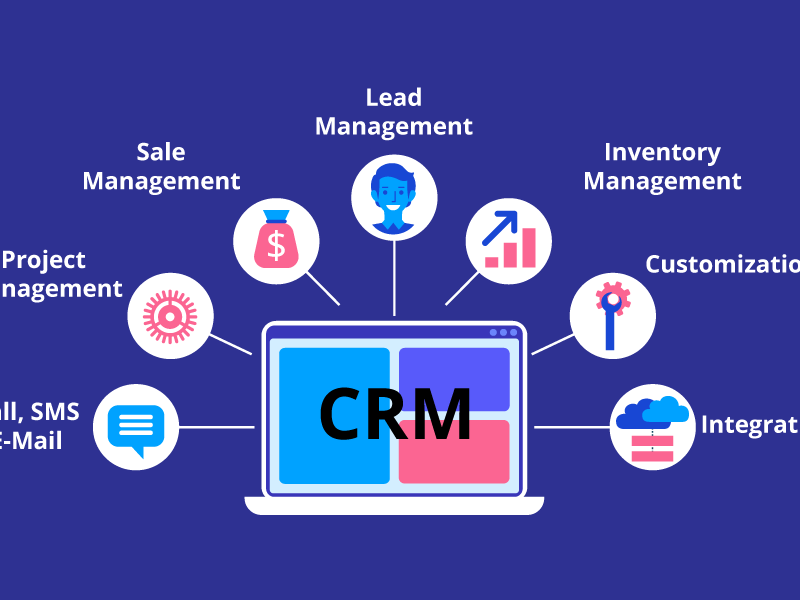Customer Relationship Management (CRM) systems have become indispensable tools for small businesses aiming to scale their operations efficiently. In today’s competitive market, managing customer interactions and data is critical for growth and customer retention.
CRMs provide a centralized platform that streamlines sales, marketing, and customer service processes, enabling businesses to make data-driven decisions and build stronger customer relationships.
This article explores how small businesses can leverage CRM technologies to enhance their scalability, optimize operations, and achieve sustainable growth in a dynamic business environment.
How CRM Systems Help Small Businesses Scale Efficiently
CRM (Customer Relationship Management) systems play a crucial role in the growth and scalability of small businesses. These systems streamline customer interactions, provide valuable insights, and automate repetitive tasks, allowing small businesses to focus on core activities that drive growth.
By centralizing customer data and improving communication, CRM solutions help small businesses build stronger relationships with their clients, ultimately leading to increased customer loyalty and higher revenue.
Enhancing Customer Insights and Personalization
One of the key benefits of CRM systems is their ability to gather and analyze vast amounts of customer data. By consolidating customer information from various touchpoints, small businesses can gain deeper insights into customer preferences, behaviors, and pain points.
This data-driven approach enables businesses to tailor their products, services, and marketing efforts to meet the specific needs of their customers, enhancing the overall customer experience and fostering stronger relationships.
Streamlining Sales and Marketing Processes
CRM systems automate and streamline sales and marketing processes, making them more efficient and effective. Features such as lead management, sales forecasting, and marketing automation help small businesses manage their sales pipeline more effectively, identify high-potential leads, and execute targeted marketing campaigns.
By reducing manual tasks and providing real-time analytics, CRM solutions enable businesses to make data-driven decisions and optimize their sales and marketing strategies.
Improving Customer Support and Service
Effective customer support is crucial for the success of small businesses. CRM systems provide tools for tracking and managing customer interactions, enabling businesses to deliver timely and personalized support.
Features like case management, knowledge bases, and customer self-service portals enhance the support experience, leading to higher customer satisfaction and loyalty. Additionally, CRM systems help businesses identify and address issues proactively, reducing customer churn and driving long-term growth.
| CRM Benefit | Description |
|---|---|
| Enhanced Customer Insights | Consolidates customer data to provide deeper understanding of customer preferences and behaviors. |
| Streamlined Sales and Marketing | Automates sales and marketing processes, improving efficiency and effectiveness. |
| Improved Customer Support | Enhances customer support experience with tools for tracking and managing interactions. |
What is scalability in CRM?
Scalability in CRM refers to the ability of a Customer Relationship Management system to handle growth, adapt to changes, and maintain performance as the business expands. This involves not only managing an increasing number of customers and transactions but also integrating new features, technologies, and processes seamlessly.
Scalability ensures that the CRM system remains efficient, responsive, and cost-effective, even as the volume of data and user interactions increases. It is crucial for businesses that plan to grow, as it allows them to scale their CRM operations without sacrificing performance or incurring excessive costs.
Benefits of Scalable CRM Systems
Scalability in CRM systems offers several key benefits that are essential for business growth. These include:
- Efficient Resource Management: Scalable CRM systems can dynamically allocate resources based on demand, ensuring that the system remains performant and responsive even during peak usage times.
- Cost-Effectiveness: Scalable solutions allow businesses to pay for only what they need, scaling up or down as required. This flexibility helps in controlling operational costs and avoiding over-provisioning.
- Enhanced User Experience: As the system scales, it maintains high performance and reliability, which enhances the user experience for both internal teams and external customers. This leads to higher satisfaction and loyalty.
Key Features of Scalable CRM Systems
To ensure scalability, CRM systems should possess certain key features that enable them to handle growth effectively. These features include:
- Modular Architecture: A modular architecture allows the system to be easily expanded and customized without impacting existing functionalities. This makes it easier to add new features or modules as the business grows.
- Cloud-Based Solutions: Cloud-based CRM systems offer greater scalability as they can be easily scaled up or down based on demand. This also ensures that the system is always up-to-date with the latest features and security patches.
- Data Management and Integration: Scalable CRM systems should have robust data management capabilities and seamless integration with other business tools. This ensures that data remains consistent and accurate, even as the volume of data grows.
Challenges and Considerations for CRM Scalability
While scalability is critical, it also comes with its own set of challenges and considerations that businesses need to address. These include:
- Data Security and Privacy: As the system scales, the risk of data breaches and privacy violations increases. Implementing robust security measures and compliance with data protection regulations is essential.
- Performance Optimization: Ensuring that the system remains performant as it scales requires continuous monitoring and optimization. This includes fine-tuning the database, improving query performance, and optimizing resource allocation.
- Training and Adoption: Scalability also involves ensuring that employees are trained and comfortable with new features and processes. This helps in maintaining high adoption rates and maximizing the benefits of the CRM system.
What is the role of CRM in business?
The role of Customer Relationship Management (CRM) in business is multifaceted and essential for fostering growth, enhancing customer satisfaction, and improving operational efficiency.
CRM systems help businesses manage and analyze customer interactions and data throughout the customer lifecycle, from initial engagement to long-term relationship building.
By centralizing customer information, CRM tools enable businesses to better understand customer needs, preferences, and behaviors, leading to more personalized and effective marketing, sales, and service strategies. This, in turn, can drive higher customer retention rates, increased sales, and a stronger brand reputation.
Improving Customer Service and Satisfaction
CRM systems play a crucial role in enhancing customer service and satisfaction. By providing a centralized database of customer information, CRM tools allow customer service representatives to quickly access detailed customer profiles, past interactions, and purchase history.
This enables representatives to provide more personalized and efficient support, addressing customer needs more effectively and reducing response times. Additionally, CRM systems can automate routine tasks, such as email responses and appointment scheduling, freeing up staff to focus on more complex customer issues.
- Centralized customer data for quick access
- Personalized support through detailed customer profiles
- Automation of routine tasks to improve efficiency
Enhancing Sales Performance and Efficiency
CRM systems are instrumental in boosting sales performance and efficiency. By tracking sales activities and customer interactions, CRM tools provide valuable insights into sales trends and customer behavior. Sales teams can use this data to identify high-potential leads, tailor their sales strategies, and close deals more effectively.
CRM systems also facilitate better collaboration among team members, allowing for the sharing of best practices and the establishment of standardized sales processes. This can lead to more consistent and successful sales outcomes.
- Tracking sales activities and customer interactions
- Identifying high-potential leads through data analysis
- Standardizing sales processes for consistency
Optimizing Marketing Efforts and Campaigns
CRM systems are vital for optimizing marketing efforts and campaigns. By collecting and analyzing customer data, CRM tools help marketing teams create targeted and personalized marketing campaigns.
This data-driven approach ensures that marketing messages resonate with the intended audience, leading to higher engagement and conversion rates.
CRM systems can also track the effectiveness of marketing campaigns, providing valuable feedback that can be used to refine future strategies. This continuous improvement cycle can significantly enhance the overall return on investment (ROI) of marketing initiatives.
- Creating targeted and personalized marketing campaigns
- Tracking campaign effectiveness and gathering feedback
- Continuous improvement of marketing strategies
What is CRM and why is it so important to businesses today?

CRM, which stands for Customer Relationship Management, is a strategy and technology that businesses use to manage and analyze their interactions with customers, from the initial contact through the entire customer lifecycle.
The primary goal of CRM is to improve business relationships, leading to increased customer retention, sales growth, and profitability. By centralizing customer information and automating workflow processes, CRM systems help businesses streamline operations, enhance customer service, and gain valuable insights into customer behavior and preferences.
How CRM Systems Work
CRM systems work by collecting and storing customer data from various touchpoints, such as emails, phone calls, social media, and in-person interactions. This data is then analyzed to provide actionable insights that help businesses make informed decisions.
For instance, CRM systems can track customer purchase history, support interactions, and marketing responses, allowing companies to tailor their offerings and communications more effectively. Here are some key features of CRM systems:
- Data Management: CRM systems centralize customer data, making it easily accessible to all relevant departments.
- Automation: They automate routine tasks such as email campaigns, order processing, and customer support, freeing up staff to focus on more strategic activities.
- Analytics: CRM systems provide advanced analytics tools to help businesses understand customer behavior, identify trends, and forecast future sales.
Benefits of CRM for Businesses
The adoption of CRM systems brings numerous benefits to businesses. Firstly, it enhances customer satisfaction by ensuring that all customer interactions are managed efficiently and professionally. Secondly, it improves sales performance through better lead management and targeted marketing efforts.
Lastly, it fosters long-term customer loyalty by providing personalized experiences and timely support. Here are some specific benefits:
- Improved Customer Service: CRM systems help businesses provide faster and more accurate responses to customer inquiries and issues, leading to higher customer satisfaction.
- Increased Sales Efficiency: By automating sales processes and providing real-time data, CRM systems enable sales teams to close deals more quickly and effectively.
- Enhanced Data Accuracy: Centralized data management reduces errors and ensures that all team members have access to the most up-to-date information.
Challenges in Implementing CRM
While the benefits of CRM are clear, implementing these systems can pose several challenges. One common issue is data integration, as businesses often need to consolidate data from multiple sources. Another challenge is user adoption, as employees may resist new technologies or processes.
Finally, cost can be a concern, particularly for smaller businesses, as CRM systems can be expensive to implement and maintain. Here are some strategies to overcome these challenges:
- Data Integration: Work with a CRM provider that offers robust integration capabilities and ensure that data is seamlessly transferred between systems.
- User Training: Provide comprehensive training and support to help employees understand the benefits and proper use of the CRM system.
- Cost Management: Consider scalable solutions that allow for incremental investments and seek out vendors that offer flexible pricing plans.
Why do 70% of CRM projects fail?
CRM projects often encounter numerous challenges that lead to a reported 70% failure rate. These failures can be attributed to a combination of technological, organizational, and strategic factors. One of the primary reasons is the lack of clear goals and objectives.
Many organizations embark on CRM implementations without a well-defined strategy, leading to misalignment between the CRM system and the business needs. Another significant issue is inadequate user adoption.
If employees are not properly trained or if the system is too complex, they may resist using it, which can severely undermines the project’s success. Additionally, technical difficulties and poor data management can also contribute to CRM project failures.
Issues such as data quality, integration with existing systems, and system scalability can lead to functional limitations and user frustration.
1. Lack of Clear Goals and Objectives
The absence of well-defined goals and objectives is a critical factor in CRM project failures. When organizations do not establish a clear vision and specific objectives, they risk implementing a system that does not meet their business needs.
This can result in wasted resources, both financial and human, and a lack of return on investment. To avoid this, it is essential to conduct a thorough needs assessment and involve key stakeholders in the planning process. This ensures that the CRM system aligns with the organization’s strategic objectives and addresses specific business challenges.
- Conduct a comprehensive needs assessment to identify key business requirements.
- Involve all relevant stakeholders in the planning and decision-making process.
- Set specific, measurable, achievable, relevant, and time-bound (SMART) goals.
2. Inadequate User Adoption
User adoption is a critical factor in the success of any CRM project. If employees do not use the system effectively, the project is likely to fail. This can be due to a lack of proper training, resistance to change, or a user-unfriendly interface.
To ensure high user adoption, organizations must invest in comprehensive training programs and provide ongoing support. Additionally, involving users in the early stages of the project can help address their concerns and enhance their buy-in. User-centric design principles should also be applied to create an intuitive and user-friendly interface.
- Develop a robust training program that covers all aspects of the CRM system.
- Engage users early in the project to gather feedback and address concerns.
- Design a user-friendly interface that minimizes the learning curve.
3. Technical and Data Management Issues
Technical issues and poor data management are significant hurdles in CRM project implementation. Data quality, system integration, and scalability are critical factors that can impact the success of a CRM project.
Poor data quality can lead to inaccurate insights and poor decision-making, while integration issues can result in data silos and operational inefficiencies. Scalability is also important, as the CRM system must be able to grow with the organization’s needs.
To address these challenges, it is essential to conduct thorough technical evaluations and implement robust data management practices.
- Conduct thorough technical evaluations to ensure compatibility with existing systems.
- Implement data quality management practices to maintain accurate and reliable data.
- Design the CRM system to be scalable and adaptable to future needs.
Frequently Asked Questions
How Does CRM Enhance Customer Relationships in Small Businesses?
CRM systems help small businesses manage customer interactions more effectively by centralizing customer data, automating communication, and providing insights through analytics. This allows businesses to offer personalized experiences, improve customer service, and build stronger relationships, ultimately leading to increased customer loyalty and satisfaction.
What Are the Key Features of a CRM System for Small Businesses?
Key features of a CRM system for small businesses include contact management, sales tracking, customer service tools, marketing automation, and analytics. These features help streamline operations, enhance customer interactions, and provide valuable insights that drive business growth and efficiency.
Can CRM Systems Integrate with Other Business Tools?
Yes, CRM systems can integrate with various business tools such as email marketing platforms, e-commerce solutions, social media management tools, and accounting software. This integration ensures seamless data flow, reducing manual data entry and improving overall operational efficiency.
How Does CRM Support Business Scaling?
CRM supports business scaling by providing a structured approach to managing customer data and interactions. It enables businesses to handle a growing number of customers without compromising on service quality. By automating processes and offering actionable insights, CRM helps small businesses optimize resources, improve customer retention, and drive sustainable growth.


